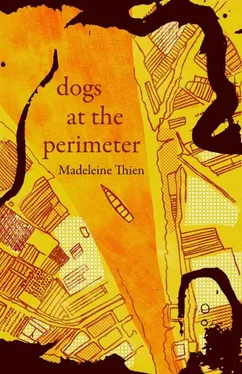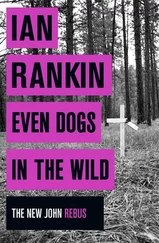At the guesthouse, Nuong takes off his wet clothes, lies down on the bed, and there is no emotion at all, just an extraordinary, disturbing stillness that Hiroji has never seen before in anyone. He had picked up the boy after he sat down in the mud, unmoving, and carried him back to Aran, piggyback style, as if they were a father and son coming home from the park on a Sunday afternoon.
He could feed this boy and defend him but there’s a limit he finally perceives now, a limit to what Nuong will say and what he, Hiroji, will ever be able to understand. The boy has survived, he’s turning into someone else, but all the broken edges are rubbing together and injuring him every time he moves.
Nuong opens his eyes and says, in English, that he’s hungry.
They get up and walk to the restaurant.
Hiroji wants to ask him if there are any foreigners in the new Cambodia, if there are doctors there, and why so few people have escaped across the border. Are the stories of the refugees true? They say the cities are empty, that children are executed for missing their parents, that torture and killing are commonplace. The French newspapers are reporting that eight hundred thousand people died in the first year of the revolution alone. But how could he ask a child such a question, even if the child knows the answer?
At the restaurant, Nuong says insistently, “I’m hungry.”
By the end of 1977, they are surrounded by scores of missionaries and aid workers, by reporters, spies, and swindlers. More shelters bubble up from the ground, more generators and supplies arrive, but it’s never enough. He alternates between a dozen camps along the border, leaving Aranyaprathet for Lumpuk and Mairut, then threading back again. The shelters, blue tarpaulins hooked onto bamboo stakes, are overrun, polluted, and dank. Twice a month, he hitches a ride in the Red Cross truck, he returns from Bangkok with cases of tinned milk and dried noodles, with notebooks and pencils for Nuong, and he does the same things over and over again, asks the same people the same questions, Xeroxes more photographs of James, phones his mother. Over the decrepit lines, he tries to reassure her. She tells him not to give up hope.
The hills are completely green, the grass is technicolour, fruit falls everywhere and rots on the ground.
The boy draws unbelievable things.
The objects in the hotel room separate. Metallic paint chips off the bodhisattva’s head.
Nuong says, in his precarious English, that he would like medicine. “What kind of medicine?” Hiroji asks, curious.
The boy just looks at him.
“What kind?” Hiroji asks again. “What kind?”
The boy cradles his head and stays in that position for a frighteningly long time.
Somewhere, now, a surgeon could burn a lesion into the boy’s brain. It’s possible to lessen Nuong’s suffering if the boy accepts some degree of loss. They can turn down the volume on all his emotions, pinch the air out of his sadness, turn him dull and pure as snow. Hiroji has professors who say there is no suffering, there is only chemistry. Suffering is a description but chemistry is the structure. In any case, a pill can dampen some receptors, dim the lights a little. Surgery can make him care a little less. Pain and suffering are not, in the end, the same thing, one can be cleaved from the other like a diamond split along its planes, so that you feel pain but you are no longer bothered by it. He has seen a patient, huddling in a corner, at the mercy of a condition so devastating that even a slight breeze from the window would cause him unbearable suffering. After surgery, he told his doctors that the pain was exactly as it was, but he did not feel it as greatly. “It’s as if,” he had said, a cool blandness in his eyes, “the pain is not being done to me. ” One day, maybe in a ten years, or fifty years, a surgeon will be able to do this with disturbing precision, destroy a whirlpool of memory, an entire system of feelings, but in the meantime it’s like taking a hatchet to a spider’s web.
By early 1979, the border area is a dead-eyed, stinking hell. He signs on as an aid worker with the Red Cross and they give him a stipend and a room. In January, the Vietnamese Communists crossed the Cambodian border, swept the Khmer Rouge aside, and took Phnom Penh in less than two weeks. The refugees wash up in their black clothes, so debilitated and disturbed that Hiroji thinks he is walking through an exhumed cemetery, they are more soil and sickness than human beings. Orphaned children piled together in a cloud of flies, little girls who are a jigsaw of bones, numb parents. He volunteers with the Red Cross but the supplies are so limited he works in a state of heartless efficiency. It’s the only way that he can cope. Film crews record a girl, the same age as Nuong, suffering from starvation. On camera, she dies. Rows of cork boards overflow with letters, queries, and pictures of the missing. He adds James’s photograph but, within a day, it’s covered over by other missing people. He falls asleep tasting flies in his mouth, he hallucinates dead women stuck to his shoes. Vancouver and the University might as well be drawn on paper, he begins to forget that other people don’t live this way. Bye-bye, the children say, when they glimpse him arriving, walking, working, leaving. Bye-bye ! He keeps James’s photo in his pocket all the time but the shame he feels searching for his brother, this foreigner, one person out of two million, distresses him.
Nuong is sponsored, all of a sudden, by a family in the United States. The adoption, arranged by an American Christian relief agency, happens so fast Hiroji is caught off guard. He has to hide his unhappiness in a bloom of smiles. In a few weeks, Nuong will board a plane from Bangkok to Chicago, and then from Chicago to Lowell, Massachusetts. His new family sends him a greeting card with a snapshot of balloons. Nuong wants to know if he will be given food on the crossing, if Hiroji will visit him, if it is advisable to take everything with him, his books, pencils, and quietly accumulated stash of Nescafé, and not glance back over his shoulder, the way the Christian missionaries taught them, to prevent the salt from flowing back up through his mouth, out his nostrils. Hiroji doesn’t know what to say, he doesn’t understand this boy.
“Why are you so sad all the time?” Nuong asks him in his now-melodic English. “Is it so very bad where you come from?”
Hiroji has to laugh.
Nuong doesn’t smile. He says, “Thank you heaven I am not going to Canada.”
More refugees arrive every month, wasting, mangled bodies.
Hiroji makes a gift to Nuong of all his remaining money, which isn’t a great deal, and the shining bodhisattva. He accompanies him as far as Bangkok and he tells Nuong to be strong, not to look back, to be brave.
The boy looks so small with his suitcase and his blunt haircut, wearing a knit sweater for the first time. He does what Hiroji says and he doesn’t look back, he launches himself courageously up into the sky.
A few weeks later, Hiroji sits with his mother in the apartment he grew up in on the east side of Vancouver. Her hair has gone wiry and white, and the tea is pale because she has been re-using the same leaves too many times. They go through all the details ten times, a hundred times. She, too, makes lists. She smiles her old smile at him and asks when he will go back to Aranyaprathet.
“Soon,” he says.
“Next month?”
“Soon.”
After a week of this they both fall silent. He spends too many hours in the second bedroom, which is overflowing with their adolescent junk: deflated soccer balls, bottle collections, homework assignments, and the assorted dregs of childhood. In a biscuit tin, he finds James’s birth certificate and an expired driver’s licence, both with his brother’s birth name, Junichiro Matsui. In each photo, James is grinning. He looks young, he looks careless, as if the days have no weight on him, as if he is higher up or better than all the rest. Hiroji shoves the id into his backpack.
Читать дальше












